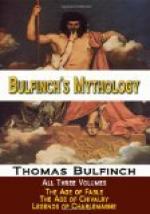Pillars of Hercules, two mountains—Calpe, now the Rock of Gibraltar, southwest corner of Spain in Europe, and Abyla, facing it in Africa across the strait
Pindar, famous Greek poet
Pindus, Grecian mountain
PIRENE, celebrated fountain at Corinth
Pirithous, king of the Lapithae in Thessaly,
and friend of
Theseus, husband of Hippodamia
Pleasure, daughter of Cupid and Psyche
Pleiades, seven of Diana’s nymphs, changed into stars, one being lost
Plenty, the Horn of
PLEXIPPUS, brother of Althea
Pliny, Roman naturalist
Pluto, the same as Hades, Dis, etc. god of the Infernal Regions
Plutus, god of wealth
Po, Italian river
POLE STAR
POLITES, youngest son of Priam of Troy
Pollux, Castor and (Dioscuri, the Twins) (See Castor)
POLYDECTES, king of Seriphus
POLYDORE, slain kinsman of Aeneas, whose blood nourished a bush that bled when broken
Polyhymnia, Muse of oratory and sacred song
POLYIDUS, soothsayer
Polynices, King of Thebes
Polyphemus, giant son of Neptune
Polyxena, daughter of King Priam of Troy
Pomona, goddess of fruit trees (See Vertumnus)
Porrex and FER’REX, sons of Leir, King of Britain
PORTUNUS, Roman name for Palaemon
Poseidon (Neptune), ruler of the ocean
Precipice, threshold of Helas hall
Prester John, a rumored priest or presbyter, a Christian pontiff in Upper Asia, believed in but never found
Priam, king of Troy
Priwen, Arthur’s shield
Procris, beloved but jealous wife of Cephalus
Procrustes, who seized travellers and bound them on his iron bed, stretching the short ones and cutting short the tall, thus also himself served by Theseus
Proetus, jealous of Bellerophon
Prometheus, creator of man, who stole fire from heaven for man’s use
Proserpine, the same as Persephone, goddess of all growing things, daughter of Ceres, carried off by Pluto
Protesilaus, slain by Hector the Trojan, allowed by the gods to return for three hours’ talk with his widow Laodomia
Proteus, the old man of the sea
Prudence (Metis), spouse of Jupiter
Pryderi, son of Pwyll
Psyche, a beautiful maiden, personification of the human soul, sought by Cupid (Love), to whom she responded, lost him by curiosity to see him (as he came to her only by night), but finally through his prayers was made immortal and restored to him, a symbol of immortality




